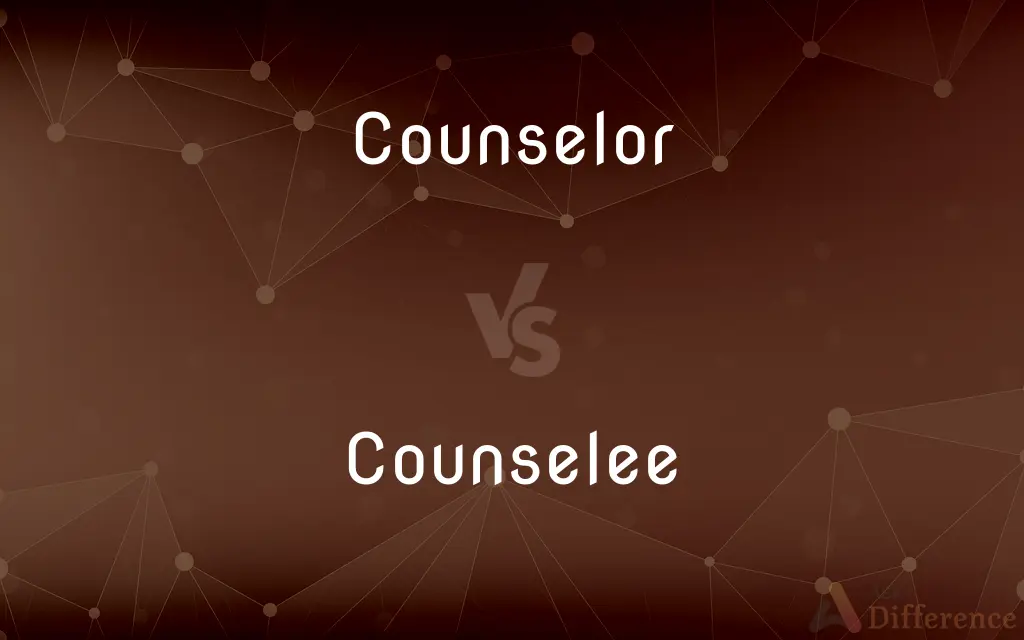Counselor vs. Counselee — What's the Difference?
By Maham Liaqat & Urooj Arif — Updated on March 19, 2024
A counselor provides guidance and advice, whereas a counselee receives it, highlighting their roles in a supportive relationship.

Difference Between Counselor and Counselee
Table of Contents
ADVERTISEMENT
Key Differences
A counselor is a professional or volunteer trained to offer advice, guidance, and support, often in educational, career, or psychological areas. They possess the expertise and qualifications to assist individuals in navigating challenges. Whereas a counselee is someone who seeks guidance and advice from a counselor. This individual approaches the counseling relationship with their concerns, questions, and issues, looking for professional support to address them.
Counselors employ various techniques and methodologies to facilitate growth, change, and development in their counselees. They use their skills in listening, empathy, and strategic questioning to help counselees explore their feelings and actions. On the other hand, counselees engage in the process by sharing their experiences, feelings, and thoughts, playing an active role in their personal development or problem-solving.
In the context of a counseling session, the counselor is responsible for maintaining a safe, confidential, and non-judgmental environment. This setting allows the counselee to feel comfortable and open to delve into personal or sensitive topics. Conversely, the counselee is expected to participate honestly and openly to the best of their ability, which is crucial for the success of the counseling process.
Counselors are bound by ethical guidelines and confidentiality agreements, ensuring that the information shared by counselees is protected and used solely for the purpose of providing effective counseling. Whereas counselees are assured of this confidentiality, which encourages them to trust the process and share freely.
The goal of the counselor is to empower the counselee, helping them to develop strategies and solutions for their issues. Meanwhile, the counselee's goal is to achieve personal growth, resolve issues, or make decisions with the guidance and support of their counselor.
ADVERTISEMENT
Comparison Chart
Role
Provides guidance and support
Receives guidance and support
Responsibility
Maintains a safe and confidential environment, employs counseling techniques
Participates actively and honestly in the counseling process
Goal
To facilitate counselee’s growth and development
To achieve personal growth or resolve issues
Bound by
Ethical guidelines and confidentiality
Participation and openness
Engagement
Uses expertise in listening, empathy, and strategic questioning
Shares personal experiences, feelings, and thoughts
Compare with Definitions
Counselor
A facilitator in group counseling sessions.
The counselor led the support group for anxiety.
Counselee
A student seeking academic or career advice.
The counselee met with the school counselor to discuss college applications.
Counselor
A person qualified to give psychological counseling.
The counselor specialized in family therapy.
Counselee
Someone who participates in counseling to resolve personal issues.
The counselee worked on strategies for managing anxiety.
Counselor
An advisor in educational settings on academic and career issues.
The college counselor advised him on his major selection.
Counselee
An individual seeking advice and guidance.
As a counselee, she felt heard and supported.
Counselor
A professional trained to offer guidance and advice.
The school counselor helped her navigate her career options.
Counselee
A person receiving psychological counseling.
The counselee attended weekly sessions for depression.
Counselor
Someone who provides support and strategies for dealing with personal issues.
The counselor provided coping strategies for stress.
Counselee
A participant in group counseling sessions.
The counselee shared his progress with the group.
Counselor
A person, especially a licensed professional, who treats people with mental, emotional, and behavioral disorders and problems. See Usage Note at council.
Counselee
A person receiving counselling.
Counselor
A person who gives counsel; an adviser.
Counselor
An attorney, especially a trial lawyer.
Counselor
A person who supervises children at a summer camp.
Counselor
A professional who counsels people, especially on personal problems.
Counselor
(education) A school counselor, often in a specialty such as careers, education, or health.
Counselor
(legal) An attorney.
Counselor
(politics) A high ranking diplomat, usually just below an ambassador or minister.
Counselor
(America) A children’s supervisor, usually at camp.
Counselor
One who counsels; an adviser.
Can he that speaks with the tongue of an enemy be a good counselor, or no?
Counselor
A member of council; one appointed to advise a sovereign or chief magistrate. [See under Consilor.]
Counselor
One whose profession is to give advice in law, and manage causes for clients in court; a barrister.
Good counselors lack no clients.
Counselor
Someone who has supervisory duties at a summer camp.
Counselor
Some who gives advice about problems
Counselor
Someone who has supervisory duties at a summer camp
Counselor
A lawyer who pleads cases in court
Common Curiosities
What is the main difference between a counselor and a counselee?
The main difference is their role in the counseling relationship; the counselor provides guidance and support, while the counselee receives it.
What responsibilities do counselees have in the counseling process?
Counselees are responsible for participating actively and honestly in the process to facilitate their growth and resolution of issues.
How does someone benefit from being a counselee?
As a counselee, individuals can gain insights, strategies, and support for personal development or problem-solving.
Can anyone become a counselor?
Becoming a counselor typically requires specific educational qualifications and training in counseling techniques.
Are counselors allowed to share information discussed in sessions?
Counselors are bound by confidentiality and ethical guidelines to not share information disclosed in sessions without consent.
Do all counselors have the same qualifications?
The qualifications of counselors can vary depending on their specialty area (e.g., school, career, family therapy).
How does a counselor build trust with a counselee?
Through maintaining confidentiality, showing empathy, and providing a safe space for open communication.
What makes a good counselor?
A good counselor possesses empathy, listening skills, and the ability to facilitate growth and change effectively.
Is counseling only for mental health issues?
Counseling can address a wide range of issues, including career guidance, educational advising, and personal development, not just mental health.
Can a counselee refuse certain advice or strategies?
Yes, counselees can refuse advice or strategies if they feel they are not suitable for their situation.
How does counseling help with career decisions?
Counseling can provide insights, assessments, and guidance to help individuals make informed career decisions.
Can counseling sessions be done in groups?
Yes, counseling can be conducted in group settings, which can provide additional support and perspectives.
Is it necessary to have a long-term commitment to counseling?
The duration of counseling depends on the individual's needs and goals; some may benefit from short-term, while others may require long-term counseling.
What ethical guidelines do counselors follow?
Counselors follow ethical guidelines that ensure confidentiality, non-discrimination, and the best interests of the counselee.
Can counseling be done online?
Yes, many counselors offer online sessions, providing greater accessibility for individuals seeking support.
Share Your Discovery

Previous Comparison
Vertical vs. Axial
Next Comparison
Compilation vs. ListAuthor Spotlight
Written by
Maham LiaqatCo-written by
Urooj ArifUrooj is a skilled content writer at Ask Difference, known for her exceptional ability to simplify complex topics into engaging and informative content. With a passion for research and a flair for clear, concise writing, she consistently delivers articles that resonate with our diverse audience.














































